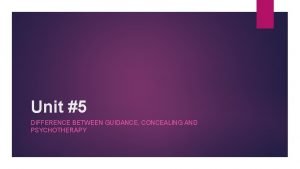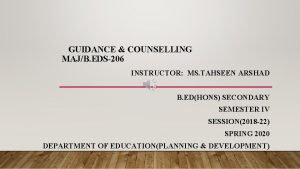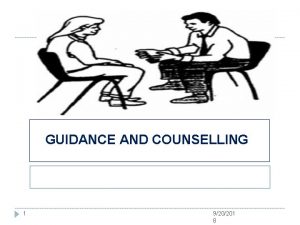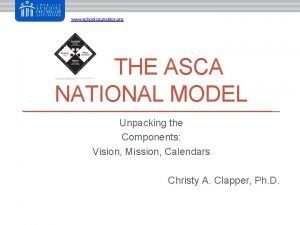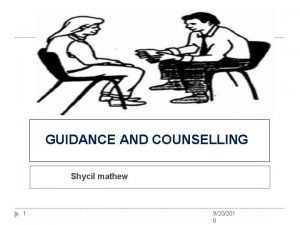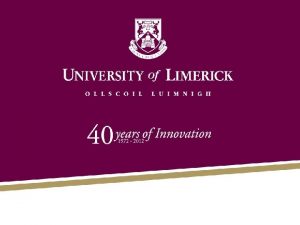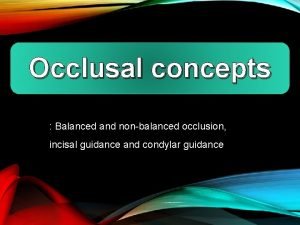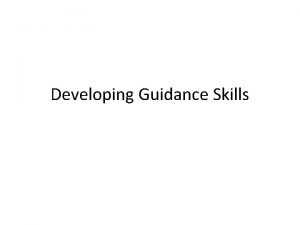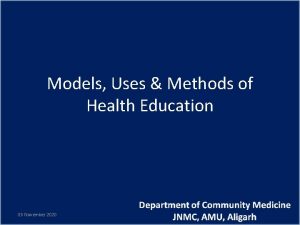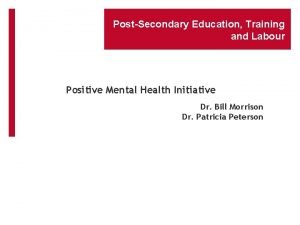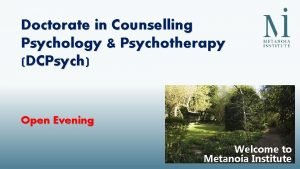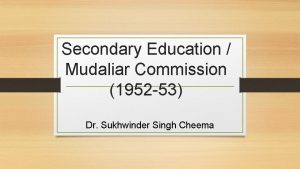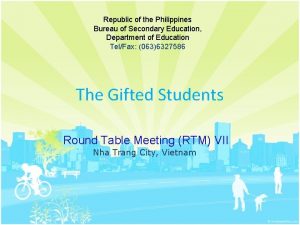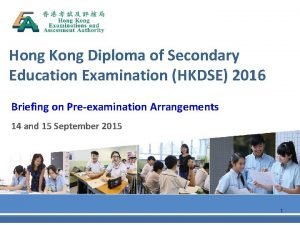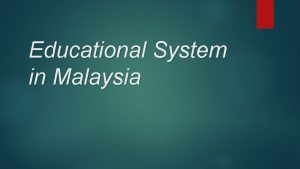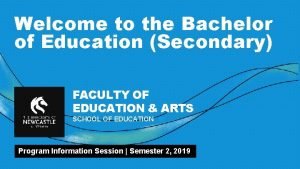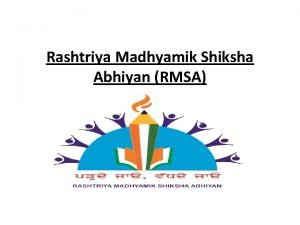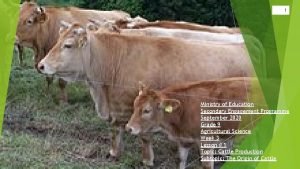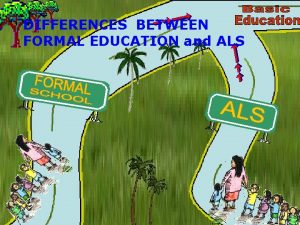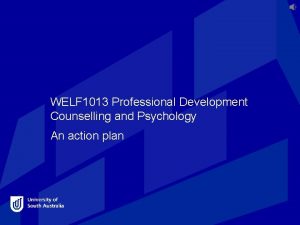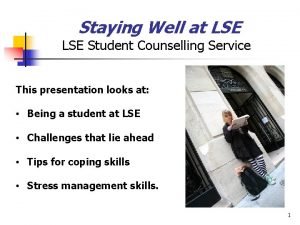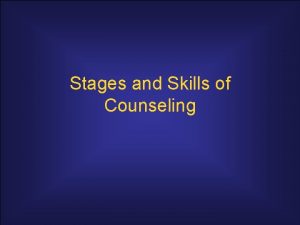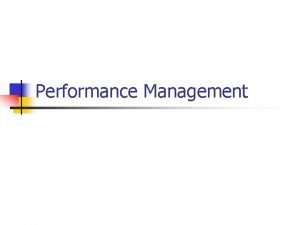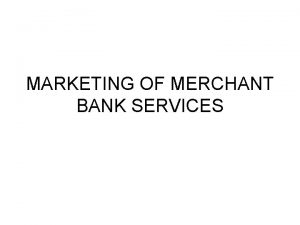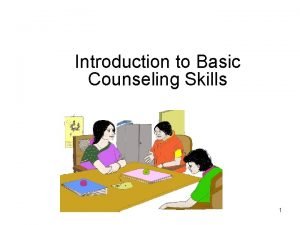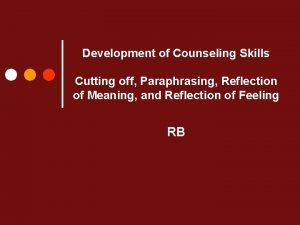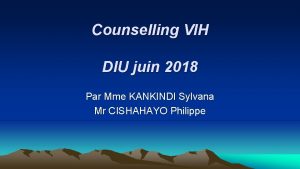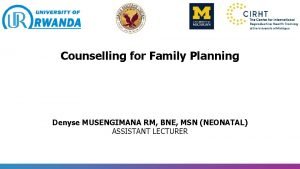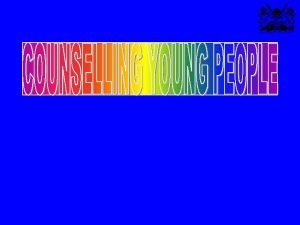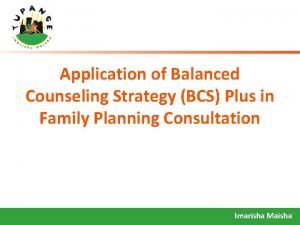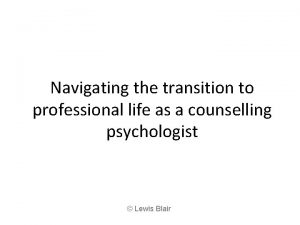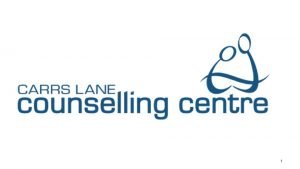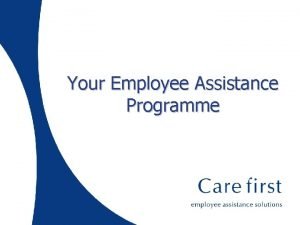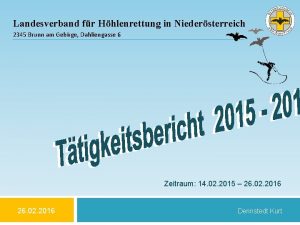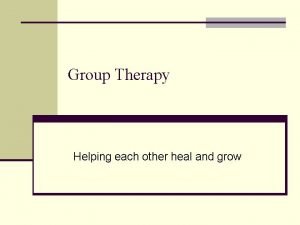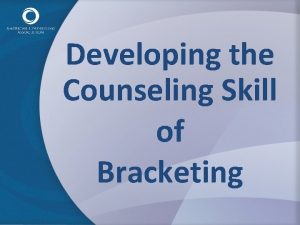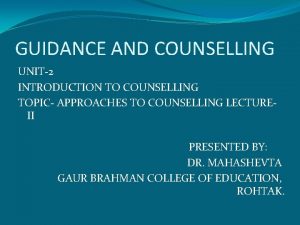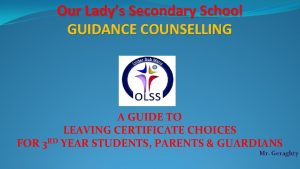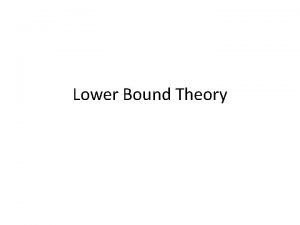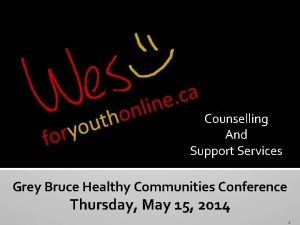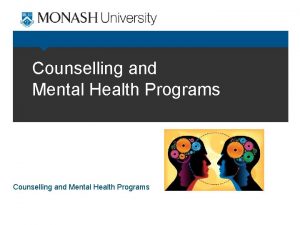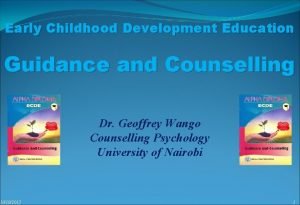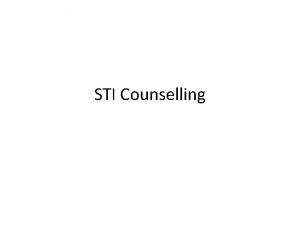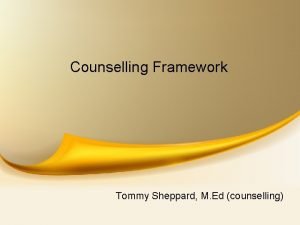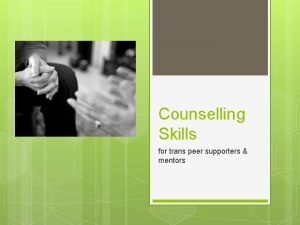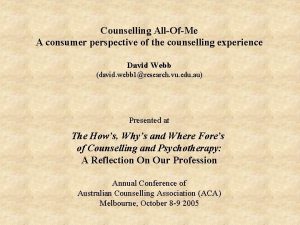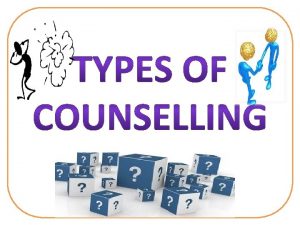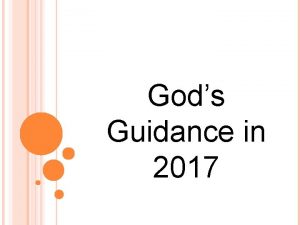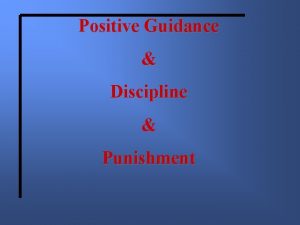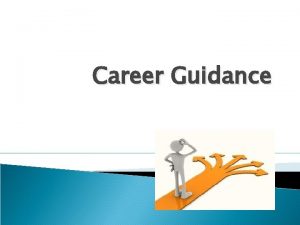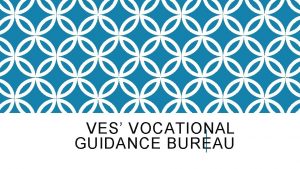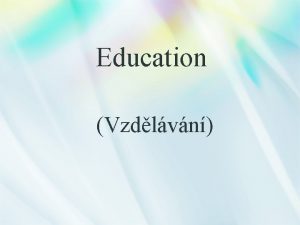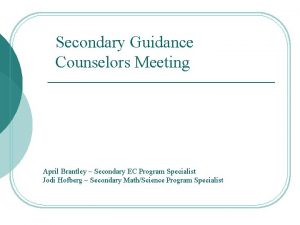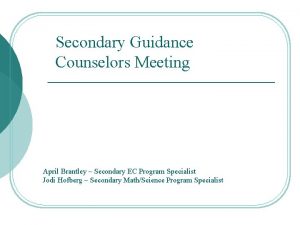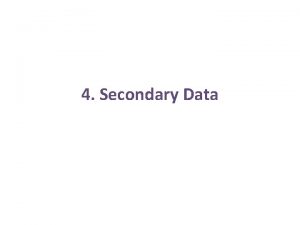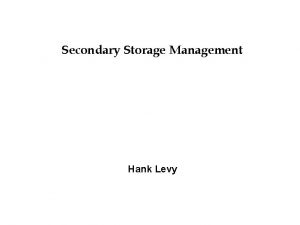Counselling and guidance in lower secondary education in













































- Slides: 45

Counselling and guidance in lower secondary education in Europe and Finland Raimo Vuorinen, Ph. D. Project Manager Finnish Institute for Educational Research, University of Jyväskylä, Finland The 18 th National Conference Euroguidance with international participation Counselling and guidance in school curricula 6 -7 October 2016, Bucharest, Romania European Lifelong Guidance Policy Network http: //elgpn. eu Coordinator: elgpn@jyu. fi With the support of the Erasmus+ Programme of the European Union

Themes for discussions… • CMS definitions • Experiences of European countries in developing CMS • Case Finland, CMS in the national core curricula • Features of good practices and policies European Lifelong Guidance Policy Network http: //elgpn. eu Coordinator: elgpn@jyu. fi With the support of the Erasmus+ Programme of the European Union

Career? Career choice European Lifelong Guidance Policy Network http: //elgpn. eu Coordinator: elgpn@jyu. fi Career construction? Life design? With the support of the Erasmus+ Programme of the European Union

Definition of Lifelong Guidance? • What? Activities: e. g. information giving, advice, counselling, assessment, teaching, advocacy • For whom/With who? All citizens • When? Any age and point in their lives • Focus? Making meaningful life choices on learning and work. Empowerment to manage learning and career • Career? Individual lifepaths in learning, work and in others settings in which these capcities and competences are learned and/or used • Where? Education, training, employment, community, private – EU Council of Ministries Resolution on lifelong guidance 2004 European Lifelong Guidance Policy Network http: //elgpn. eu Coordinator: elgpn@jyu. fi With the support of the Erasmus+ Programme of the European Union

Lifelong Career Management Skills (CMS) • “Career management skills refer to a whole range of competences which provide structured ways for individuals and groups to gather, analyse, synthesise and organise self, educational and occupational information, as well as the skills to make and implement decisions and transitions. ” (ELGPN 2010) European Lifelong Guidance Policy Network http: //elgpn. eu Coordinator: elgpn@jyu. fi With the support of the Erasmus+ Programme of the European Union

Elements of CMS (Sultana 2011) Personal choices and skills – Knowing self, self-assessment, decision-making, plans, transitions, acting in a diverse cultural environment Links between education and work – Courses and job opportunities, requirements, career exploration, learning skills The labour market – Rights and duties at work, equal opportunities, velues of different lifestyles Filtered through: – national cultures, structures and curricular traditions European Lifelong Guidance Policy Network http: //elgpn. eu Coordinator: elgpn@jyu. fi With the support of the Erasmus+ Programme of the European Union

Council Resolution on better integration of lifelong guidance into lifelong guidance strategies (2008) • • PRIORITY AREA 1: ENCOURAGE THE LIFELONG ACQUISITION OF CAREER MANAGEMENT SKILLS To make progress in this priority area, Member States should, depending on their specific situations, consider: – including teaching and learning activities which foster the development of career management skills in general, vocational and higher education programmes; – preparing teachers and trainers to conduct such activities and support them in this task; – encouraging parents to become involved in guidance issues; – involving civil society organisations and the social partners more closely in this area; – making guidance one of the objectives of schools, VET providers and higher education establishments. Integration into working life and the operation of the local, national and European labour markets are aspects, in particular, that should be taken into account. European Lifelong Guidance Policy Network http: //elgpn. eu Coordinator: elgpn@jyu. fi With the support of the Erasmus+ Programme of the European Union

Experience of European countries in development of CMS framework and integration of CMS in the education process European Lifelong Guidance Policy Network http: //elgpn. eu Coordinator: elgpn@jyu. fi With the support of the Erasmus+ Programme of the European Union

Options for guidance delivery (Zelloth 2009) CURRICULUM MODEL CENTRE MODEL INDIVIDUAL MODEL VIRTUAL or WEB-MODEL (1) Compulsory subject ‘career education’ or similar (2) Compulsory part of (an)other subject(s) (3) Compulsory curriculum principle (all or several subjects) (4) Elective subject ‘career education’ or similar (5) Part of (an)other elective subject(s) (6) Part of curricular activities (eg guidance programme) (7) Part of extra-curricular activities (eg career fairs) (1) Centre inside school/university (2) Centre outside school/university specifically for students (3) Centre for unemployed inside public employment services (4) Centre for all citizens – in- or outside educational or labour market settings (1) Specialist inside school / university / employment services (school counsellor, school psychologist or pedagogue, social worker, guidance specialist in employment offices) (2) Semi-specialist inside school / university / employment services (eg class teacher, subject teacher, (deputy)director, employment counsellor, generic career coordinator or career adviser) (1) Self-help facility at schools / public employment services / local communities (2) Web-based interactive (individual through Internet) European Lifelong Guidance Policy Network http: //elgpn. eu Coordinator: elgpn@jyu. fi With the support of the Erasmus+ Programme of the European Union

Integration of career education in national core curricula EURYDICE 2014 European Commission/EACEA/Eurydice/Cedefop, 2014. Tackling Early Leaving from Education and Training in Europe: Strategies, Policies and Measures. Eurydice and Cedefop Report. Luxembourg: Publications Office of the European Union. Chapter 5: The role of Education and Career Guidance in Tackling Early Leaving http: //eacea. ec. europa. eu/education/eurydice/documen ts/thematic_reports/175 EN. pdf European Lifelong Guidance Policy Network http: //elgpn. eu Coordinator: elgpn@jyu. fi With the support of the Erasmus+ Programme of the European Union

European Commission/ EACEA/Eurydice/Cedefop, 2014. Tackling Early Leaving from Education and Training in Europe: Strategies, Policies and Measures European Lifelong Guidance Policy Network http: //elgpn. eu Coordinator: elgpn@jyu. fi With the support of the Erasmus+ Programme of the European Union

European Commission/EACEA/Eurydice/Cedefop, 2014. Tackling Early Leaving from Education and Training in Europe: Strategies, Policies and Measures European Lifelong Guidance Policy Network http: //elgpn. eu Coordinator: elgpn@jyu. fi With the support of the Erasmus+ Programme of the European Union

European Commission/ EACEA/Eurydice/Cedefop, 2014. Tackling Early Leaving from Education and Training in Europe: Strategies, Policies and Measures RO FI European Lifelong Guidance Policy Network http: //elgpn. eu Coordinator: elgpn@jyu. fi With the support of the Erasmus+ Programme of the European Union

RO FI European Commission/EACEA/Eurydice/Cedefop, 2014. Tackling Early Leaving from Education and Training in Europe: Strategies, Policies and Measures European Lifelong Guidance Policy Network http: //elgpn. eu Coordinator: elgpn@jyu. fi With the support of the Erasmus+ Programme of the European Union

Career Development in PISA 2012 Study Sweet, R. , Nissinen, K. & Vuorinen, R. 2014. An Analysis of the Career Development Items in PISA 2012 and of their Relationship to the Characteristics of Countries, Schools, Students and Families. ELGPN Research Paper No. 1. Jyväskylä: ELGPN. http: //www. elgpn. eu/publications/browse-bylanguage/english/elgpn-research-paper-no. -1 -pisa/ European Lifelong Guidance Policy Network http: //elgpn. eu Coordinator: elgpn@jyu. fi With the support of the Erasmus+ Programme of the European Union

5, 50 LAT 5, 00 CAN AUT CRO FIN SLO AUS Perceived competence 4, 50 HUN 4, 00 LUX IRL SER NZL ITA 3, 50 DNK SIN SVK MAC 3, 00 PRT KOR HKG BEL R 2=0. 48 2, 50 SHA 2, 00 2, 50 3, 00 3, 50 4, 00 4, 50 5, 00 5, 50 Participation in career development activities and perceived career development competence Sweet, Nissinen & Vuorinen (2014) An analysis of the career development items in PISA 2012 and of their relationship to the characteristics of countries, schools, students and families ELGPN Research Paper 1 European Lifelong Guidance Policy Network http: //elgpn. eu Coordinator: elgpn@jyu. fi With the support of the Erasmus+ Programme of the European Union

Blueprint for Life/Work Design ~ Redekopp, Hache, & Jarvis, 2000

CMS framework in Portugal (ELGPN, 2012) Competencies Develop a positive self-concept Interact effectively LEVEL OF ACHIEVEMENT Analyse Explore Identify the personal Analyse the influence of characteristics and self in different contexts of become aware of self life and behaviours that affect it Identify the importance of communication in different life contexts Act Assess Adopt strategies that Assess strategies and enhance an adequate self behaviours adopted -concept which promotes a solid identity Analyse and internalise Adopt strategies for strategies to build positive interaction in relationships different contexts of life Assess strategies and behaviours adopted Identify the nature Analyse and validate and sources of strategies for effective information needed to information management manage the career/life plan Adopt strategies for autonomous information management on the economy, society and opportunities for learning and working Assess strategies and behaviours adopted Manage change Identify different Analyse the processes of transitions throughout change/transition and the life and the ways to benefits of proactivity experience them Adopt strategies to facilitate transitions in the various contexts of life as an agent of change Assess strategies and behaviours adopted Make decisions Identify the underlying Analyse the relationship principles of decision- of the decision-making process to career management Adopt positive strategies of decision-making Assess strategies and behaviours adopted Access the labour market Identify the necessary strategies and skills to access the labour market Adopt adequate Assess strategies and strategies to integrate and behaviours adopted stay within the labour market Manage information Analyse the strategies to integrate and stay within the labour market

ELGPN Tool No. 4 European Lifelong Guidance Policy Network http: //elgpn. eu Coordinator: elgpn@jyu. fi With the support of the Erasmus+ Programme of the European Union

ELGPN TOOL NO. 4: DESIGNING AND IMPLEMENTING POLICIES RELATED TO CAREER MANAGEMENT SKILLS Questions that policies need to address (ELGPN, 2012) Lessons learned by Member States in CMS-related policies 1. What does CMS mean in your country? European Lifelong Guidance Policy Network http: //elgpn. eu Coordinator: elgpn@jyu. fi Conclusions and Recommendations by ELGPN delegates In a simple literal translation of the English definitions of lifelong guidance and CMS the core of those concepts may be lost. The set of CMS in your country needs to be defined and be grounded in a national context and set out in a national CMS framework. Compose a group of stakeholders from different sectors and experts to explore the concept of lifelong guidance, of CMS, resolve the language issues related to the definition of CMS, explore the “questions that policies need to address” and to propose an agenda and an initial plan to facilitate a common understanding of CMS. With the support of the Erasmus+ Programme of the European Union

ELGPN TOOL NO. 4: DESIGNING AND IMPLEMENTING POLICIES RELATED TO CAREER MANAGEMENT SKILLS Questions that policies need to address (ELGPN, 2012) Lessons learned by Member States in CMS-related policies Conclusions and Recommendations by ELGPN delegates 2. How will citizens develop CMS throughout their lifetime? A CMS framework, detailing the CMS development of all citizens over the life-span, addresses the questions: What CMS (knowledge, skills and attitude) to learn? How to learn CMS? When or where/in which context, CMS are learned? ’ How is the CMS framework going to be evaluated? European Lifelong Guidance Policy Network http: //elgpn. eu Coordinator: elgpn@jyu. fi CMS development should be considered as a ’work in progress’: citizens will have developed CMS to varying degrees, acquisition of CMS should not be assumed For consistency reasons: use the same concepts and methods for CMS development across the various sectors. With the support of the Erasmus+ Programme of the European Union

ELGPN TOOL NO. 4: DESIGNING AND IMPLEMENTING POLICIES RELATED TO CAREER MANAGEMENT SKILLS Questions that policies need to address (ELGPN, 2012) Lessons learned by Member States in CMS-related policies 4. Who will teach and train CMS development with the citizens? How are guidance (semi-) professionals trained in delivering CMS development? European Lifelong Guidance Policy Network http: //elgpn. eu Coordinator: elgpn@jyu. fi Conclusions and Recommendations by ELGPN delegates CMS development needs to be supported by skilled, welltrained and motivated professionals and semiprofessionals 42% of European teachers currently have a high or moderate level of need for professional development in career guidance as shown in the Teaching and Learning International Survey TALIS 2013 of the OECD (In: European Commission /EACEA /Eurydice /Cedefop, 2014, p. 95). All initial teacher training should include a compulsory ‘guidance’ and CMS development’ module , with theoretical background and methodologies of CMS development, assessment, how to integrate CMS teaching in (school)subjects and get to know real experiences in enterprises. All semi-professionals should have the opportunity to qualify in guidance and have the support/ cooperation of guidance professionals to develop and maintain the lifelong guidance perspective. With the support of the Erasmus+ Programme of the European Union

Case Finland: CMS in core curricula 2014 European Lifelong Guidance Policy Network http: //elgpn. eu Coordinator: elgpn@jyu. fi With the support of the Erasmus+ Programme of the European Union

Guidance in legislation – Guidance as a student entitlement in Finland Acts for comprehensive, upper secondary and vocational education: • Pupils and students are entitled to have educational and vocational guidance during every working day at school • Career guidance/Career education as a compulsory subject in the student’s time table – a specific 76 hours time slot allocated to career related activities • Additionnally, pupils have opportunity for “Introduction-towork-life” periods before their choice on upper secondary education European Lifelong Guidance Policy Network http: //elgpn. eu Coordinator: elgpn@jyu. fi With the support of the Erasmus+ Programme of the European Union

Guidance in legislation (2) Decrees for comprehensive education, upper secondary and vocational education : • student counsellors take care of vocational and educational guidance • cooperation with working life – possibility to have time for work experience • guidance and counselling in classrooms, possibility to have personal counselling • • Upper secondary general education 38 hours compulsory module + 38 hours optional module in career education - > 2016: 76 hours compulsory VET: 1, 5 credits integrated European Lifelong Guidance Policy Network http: //elgpn. eu Coordinator: elgpn@jyu. fi With the support of the Erasmus+ Programme of the European Union

Professionalism in Finland • National recommendation for a ratio of 250 students per counsellor • The qualifications and competences of school counsellors are regulated: – a Master’s degree in school counselling OR – a 60 ECTS postgraduate diploma in school counselling. European Lifelong Guidance Policy Network http: //elgpn. eu Coordinator: elgpn@jyu. fi With the support of the Erasmus+ Programme of the European Union

National guidelines for guidance provision and career education 2003 – 2004 - comprehensive and upper secondary education • Goals of the national core curricula in career education in Finland – support personal growth and development – promote the development of study skills and to help in learning difficulties – counsel and guide students in educational and occupational orientation –… – Introduction of ICT-based career information and career services as a compulsory element European Lifelong Guidance Policy Network http: //elgpn. eu Coordinator: elgpn@jyu. fi With the support of the Erasmus+ Programme of the European Union

National core curricula - local implementation • A strategic and operational plan for the guidance provision • Co-operation with parents/guardians • Structured co-operation with enterprices – Online support for local co-operation http: //peda. net/tet • Regular evaluation of produced services – National quality criteria for career guidance 2014 • A holistic approach • School counsellor, every teacher and principal are delivering counselling services (responsibilities) • Multi-professional cooperation – expert groups European Lifelong Guidance Policy Network http: //elgpn. eu Coordinator: elgpn@jyu. fi With the support of the Erasmus+ Programme of the European Union

Criteria for quality career education in comprehensive and upper secondary level education in Finland (2014) • Themes – – – Sufficient and comprehensive guidance Support for active engagement and taking responsibility Joint ownership of the provision by all staff members Competent and qualified staff Promotion of equity and equal opportunities Institutional plan for service delivery Support for transition phases Support for choices on education and career Employability skills and familiarisation with working life Interactive co-operation in the service provision Marketing the career services Integrating the quality criteria in local quality development frameworks European Lifelong Guidance Policy Network http: //elgpn. eu Coordinator: elgpn@jyu. fi With the support of the Erasmus+ Programme of the European Union

Revision of the core curricula 2014 • The National Board of Education has endorsed the new core curricula for comprehensive education in 2014, implementation in 2016 – Career Education remains as a compulsory subject for pupils in comprehensive education (76 hours + individual guidance and work shadowing 2 weeks) – The school must provide a plan on the overall goals and description on the division of labour in a local networked context – CMS as a continuum – Lifelong Career Management Skills, personal development and support for learning European Lifelong Guidance Policy Network http: //elgpn. eu Coordinator: elgpn@jyu. fi With the support of the Erasmus+ Programme of the European Union

Links between career education and the transversal competences in the core curricula (Finnish National Board of Education 2014) Objectives for Career Education, grades 7 -9 § Engagement and active citizenship § Learning to learn § Lifelong learning § Self-awarenness § Setting goals § Focus on working life § LMI in career planning § Cultural awarennes and internationalisation European Lifelong Guidance Policy Network http: //elgpn. eu Coordinator: elgpn@jyu. fi Objectives for transversal competences § Thinking and learning to learn (C 1) § Cultural competences, communication (C 2) § Self management in daily life (C 3) § Multiliteracy (C 4) § Digital competens (C 5) § Working life comperences and entrepreneurial skills (C 6) § Engagement, influencing sustainable future (C 7) With the support of the Erasmus+ Programme of the European Union

ELGPN Products http: //elgpn. eu/publications ELGPN Toolbox: - LLG Policy Development, European Resource Kit for Policy Makers - Glossary - Evidence Guide - Career Management Skills - Quality and Evidence - Guidelines for Policies and Systems Development for LLG ELGPN Progress reports 2008 -15 Concept Notes Research Paper Policy Briefings European Lifelong Guidance Policy Network http: //elgpn. eu Coordinator: elgpn@jyu. fi With the support of the Erasmus+ Programme of the European Union

ELGPN Tool No. 3 European Lifelong Guidance Policy Network http: //elgpn. eu Coordinator: elgpn@jyu. fi With the support of the Erasmus+ Programme of the European Union

Types of impact and beneficiaries of impact (Hooley 2014; Borbely-Pecze 2011; Nykänen ym. 2007) European Lifelong Guidance Policy Network http: //elgpn. eu Coordinator: elgpn@jyu. fi With the support of the Erasmus+ Programme of the European Union

Developing new policies and services Lifelong guidance is most effective where it: 1. 2. Is lifelong and progressive. Connects meaningfully to the wider experience and lives of the individuals who participate in it. 3. Recognises the diversity of individuals and provides services relevant to their needs. 4. Combines a range of interventions (e. g. one-to-one and online support). 5. Encourages the acquisition of career management skills. 6. Is holistic and well-integrated into other support services. 7. Involves employers and working people, and provide active experiences of workplaces. 8. Is delivered by skilled, well-trained and motivated practitioners. 9. Draws on good-quality career information. 10. Is quality-assured and evaluated. European Lifelong Guidance Policy Network http: //elgpn. eu Coordinator: elgpn@jyu. fi With the support of the Erasmus+ Programme of the European Union

ELGPN Tool No. 6 European Lifelong Guidance Policy Network http: //elgpn. eu Coordinator: elgpn@jyu. fi With the support of the Erasmus+ Programme of the European Union

What is a policy Guideline? • A systematically developed statement, • Based on best available evidence, • To assist policymakers to make decisions about appropriate policy measures for specific circumstances and populations, and • To assist in policy implementation and interpretation European Lifelong Guidance Policy Network http: //elgpn. eu Coordinator: elgpn@jyu. fi With the support of the Erasmus+ Programme of the European Union

The functions of a Guideline in the context of career services? • To promote consistency in service provision to intended populations and circumstances • To provide a focus for discussion among stakeholders: e. g. policymakers, service delivery managers, the public, professionals, on issues related to service provision • To assist reviews of existing provision European Lifelong Guidance Policy Network http: //elgpn. eu Coordinator: elgpn@jyu. fi With the support of the Erasmus+ Programme of the European Union

ELGPN Tool No. 6: GUIDELINES FOR POLICIES AND SYSTEMS DEVELOPMENT FOR LIFELONG GUIDANCE: A REFERENCE FRAMEWORK FOR THE EU AND FOR THE COMMISSION Transversal policy components (9 Guidelines) 1. Career Management Skills 2. Access to Lifelong Guidance Services 3. Ensuring the Quality of Lifelong Guidance Provision 4. Assessing the Effectiveness of Lifelong Guidance Provision 5. Strategic Leadership: Cooperation and Coordination 6. Improving Careers Information 7. The Training and Qualifications of Practitioners 8. Funding Lifelong Guidance Services 9. Information and Communications Technology European Lifelong Guidance Policy Network http: //elgpn. eu Coordinator: elgpn@jyu. fi With the support of the Erasmus+ Programme of the European Union

ELGPN Tool No 6: GUIDELINES FOR POLICIES AND SYSTEMS DEVELOPMENT FOR LIFELONG GUIDANCE: A REFERENCE FRAMEWORK FOR THE EU AND FOR THE COMMISSION Education and training sector (4 Guidelines) 10. Lifelong Guidance for School Pupils 11. Lifelong Guidance for VET Students and Participants 12. Lifelong Guidance for Higher Education Students 13. Lifelong Guidance for Adult Learners Employment and Third Age sectors (3 Guidelines) 14. Lifelong Guidance for the Employed 15. Lifelong Guidance for the Unemployed 16. Lifelong Guidance for Older Adults Social inclusion (2 Guidelines) 17. Lifelong Guidance for Youth at Risk 18. Lifelong Guidance for Disadvantaged Groups European Lifelong Guidance Policy Network http: //elgpn. eu Coordinator: elgpn@jyu. fi With the support of the Erasmus+ Programme of the European Union

Each Guideline……. . has four parts: (i) Definition of the content; (ii) Why it is important- rationale; (iii) What is good practice – elements of good policies and systems and, iv) A list of reference material for policy-makers European Lifelong Guidance Policy Network http: //elgpn. eu Coordinator: elgpn@jyu. fi With the support of the Erasmus+ Programme of the European Union

Example: Schools DEFINITION: . . range of pedagogical services, programmes, activities…related to understanding learning pathways…transitions. . . support for parents…within the school or outside the school or in combination WHY IT IS IMPORTANT: …. . linked to key indicators for a school’s performance such as participation, performance, progression, retention…. . individual differences in pupils’ capacities to identify, source and interpret information about self and the world of work…. differences for parents, communities, teachers, school management in knowledge of occupations and the labour market…. . key transition and selection points in learning pathways…to assure efficient investment in the next stage of education and training…. ELEMENTS OF GOOD EXAMPLES OF POLICIES: …. that include…. . support for a comprehensive approach to career learning…. . promote CMS learning in the curriculum…. . and entrepreneurial skills…. support for parents…career learning outcomes approach…. sensitive to pupil diversity and gender…provide the necessary resources to schools…. . staff training, service monitoring, data collection and evaluation European Lifelong Guidance Policy Network http: //elgpn. eu Coordinator: elgpn@jyu. fi With the support of the Erasmus+ Programme of the European Union

CMS in Romanian context? e. g. • What are specific contextual features in Romania which should be taken into account in a national CMS framework? • What could be learned/applied from other European countries? European Lifelong Guidance Policy Network http: //elgpn. eu Coordinator: elgpn@jyu. fi With the support of the Erasmus+ Programme of the European Union

How to integrate CMS in curriculum? e. g. • What features support the integration of CMS in the curriculum in Romania? • What potential barriers exist? • What kind of co-operation would be possible among different actors? European Lifelong Guidance Policy Network http: //elgpn. eu Coordinator: elgpn@jyu. fi With the support of the Erasmus+ Programme of the European Union

Thank you! For further information, please contact: Raimo Vuorinen, Senior researcher, Ph. D. Finnish Institute for Educational Research P. O. Box 35 FI-40014 University of Jyväskylä tel. +358 -50 -3611909 Fax +358 -14 -617418 email: raimo. vuorinen@jyu. fi Skype: vuorai European Lifelong Guidance Policy Network http: //elgpn. eu Coordinator: elgpn@jyu. fi With the support of the Erasmus+ Programme of the European Union
 Different between guidance and counselling
Different between guidance and counselling Difference between counselling and guidance
Difference between counselling and guidance Advantages of non directive counselling
Advantages of non directive counselling History of career guidance in the philippines
History of career guidance in the philippines Asca vision statement examples
Asca vision statement examples Small mouth big talk
Small mouth big talk Guidance counselling and lifespan development
Guidance counselling and lifespan development Lingualized occlusion vs balanced occlusion
Lingualized occlusion vs balanced occlusion Indirect and direct guidance
Indirect and direct guidance Differences between health education and physical education
Differences between health education and physical education Difference between counselling and health education
Difference between counselling and health education Post secondary education training and labour
Post secondary education training and labour Black and asian counselling network
Black and asian counselling network Doctorate in counselling psychology
Doctorate in counselling psychology Sub-saharan africa
Sub-saharan africa Introduction of secondary education commission
Introduction of secondary education commission Special curricular programs at the secondary level
Special curricular programs at the secondary level Hong kong diploma of secondary education examination
Hong kong diploma of secondary education examination Level of education in malaysia
Level of education in malaysia Functions of community
Functions of community Educ4197
Educ4197 Recommendation of rashtriya madhyamik shiksha abhiyan
Recommendation of rashtriya madhyamik shiksha abhiyan Secondary engagement programme
Secondary engagement programme Difference between education and literacy
Difference between education and literacy Counselling action plan
Counselling action plan Lse counselling service
Lse counselling service Stages of a process structure
Stages of a process structure What is performance appraisal
What is performance appraisal Qualities of merchant bankers
Qualities of merchant bankers Project counselling in merchant banking
Project counselling in merchant banking Objectives of counselling
Objectives of counselling Reflection of meaning counseling examples
Reflection of meaning counseling examples Scope of councelling
Scope of councelling Counselling définition oms
Counselling définition oms Gather in family planning
Gather in family planning Les étapes du counseling
Les étapes du counseling Broad objective
Broad objective Concepts of counselling
Concepts of counselling Balanced counseling strategy
Balanced counseling strategy Barbara douglas counselling psychologist
Barbara douglas counselling psychologist Safety counselling
Safety counselling Carrs lane counselling
Carrs lane counselling Care first counselling review
Care first counselling review Neunkirchen counselling
Neunkirchen counselling Disadvantages of group therapy
Disadvantages of group therapy Kaplan aca
Kaplan aca
